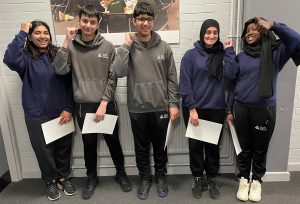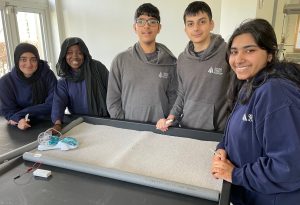Students from Dixons Trinity Academy are celebrating after winning an inter-school competition to create a Net Zero island.
The challenge, set by the region’s gas distributor, Northern Gas Networks (NGN) in partnership with the University of Bradford, Bechtle, DNV, the SkillsHouse and Bradford Council saw teams of year nine students, aged 13 and 14, develop ideas for sustainable living on a fictional Net Zero island.
The teams of up to six pupils explored how they would produce energy for heating and cooking, manage waste and fuel transport for a population of 30,000, without creating carbon emissions.
The UK government has set a target of achieving Net Zero carbon emissions by 2050 as it looks to tackle and reverse the effects of climate change on the environment and the goal in Bradford, to achieve net zero carbon by 2038, is even more ambitious.
Pupils from Dixons Trinity, Woodhouse Grove, and St Bede’s and St Joseph’s schools in Bradford took up the challenge and, following a launch event in February, spent eight weeks developing their ideas.
At an event hosted at the University of Bradford this week, the three schools presented their ideas to judges Tim Harwood of NGN, David Siggins of Bechtle, James Machell of the University of Bradford, David Tomkin of DNV and Shafia Chowdhury and Sally Jones of Bradford Council.
In total 33 pupils pitched their ideas to the judges in a Dragon’s Den style challenge, with a team from Dixons Trinity Academy named the winners. Whilst attending the event, pupils also took part in a workshop to explore fuel cells as a way of supporting the decarbonisation of transport.
Dixons Trinity’s won the competition after presenting ideas for a robust energy production system, a waste management plan, a transport strategy and a plan for heating every home, to ensure that their island achieved Net Zero. The plan included every house on the island having free roof solar panels fitted. They proposed walkable cities where amenities would be accessible by foot, operating e-ferries and using food waste to generate enough energy to power electricity to more than 350 homes on their island for a year.
Dixons Trinity’s teacher Jonathan Robinson said “The students have put a huge amount of work into their island, and have spent weeks researching and developing projects that are at the front of net zero science. The community at Dixons Trinity is so incredibly proud of their accomplishment, and we have been delighted to see young minds across Bradford come together to challenge the climate issues facing our society’s future.”
Year nine pupil, Neeya from the winning team added “It was a big challenge. The competition allowed me to develop my independent research skills and I really enjoyed learning about parts of climate change that we don’t look at in school.”
Commenting on the presentations, Tim Harwood of NGN said “All the pupils who took part should feel very proud. I was amazed that each team came up with very different answers to the same question and the creativity of the pupils’ ideas and the range of research undertaken was very impressive.”
Dr James Machell, STEM Curriculum Development Manager at the University of Bradford, said: “The students went beyond ideas into serious understanding of the technologies they were talking about.
“It is clear they had the understanding to develop a solution in a dynamic way.”
Sally Jones, Environment Manager at Bradford Council’s Sustainability Service, added: “We saw some amazing engineering solutions and holistic ideas for a greener future. They were such a high standard.”
All the pupils who took part have been invited to attend DNV’s Spadeadam Research and Testing facility located in Cumbria in June, where they will have the opportunity to learn more about DNV’s research into low carbon technologies and how these will contribute to our net zero goals.
David Tomkin from DNV said “The winning team displayed an amazing depth of knowledge around the issues their ‘net zero island’ would face – clearly borne from hard work researching the subject in advance. They recognised the challenges which we all face in any energy transition and I was impressed by their use of references and passion for the project.
But what stood out most for me was how serious all the children, from all the schools and groups took the subject and each and every one of them have made their school and community proud. It was clear for me that with students such as these, the future does not have to look bleak, as the variety of fantastic engineering, scientific and sustainability ideas put forward was simply superb – well done everyone”
END
Photographs show the winning team members from Dixons Trinity Academy – Neeya, Safa, Kenya, Ayaan and Emanuel





